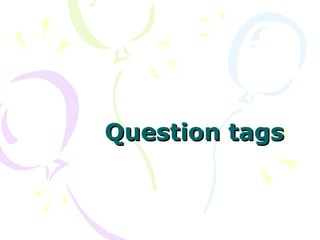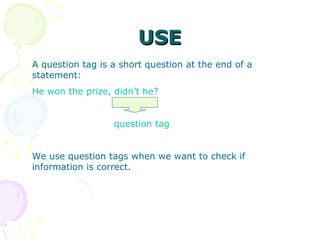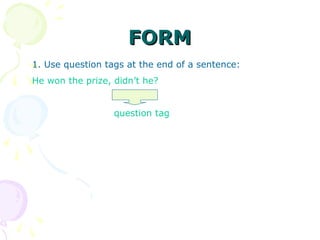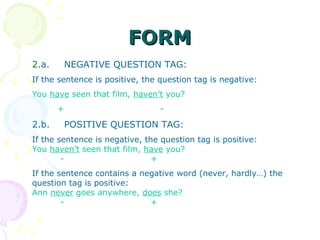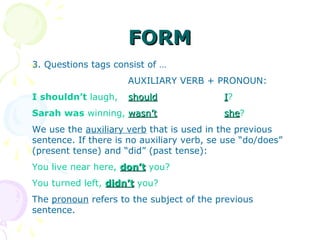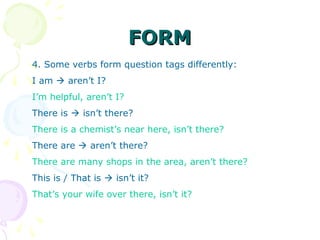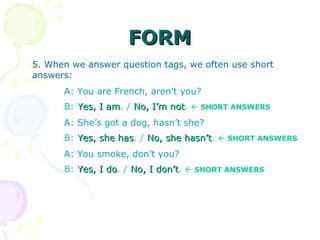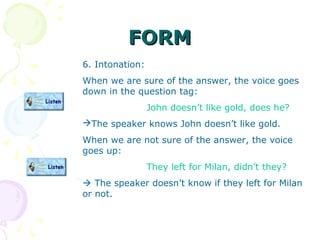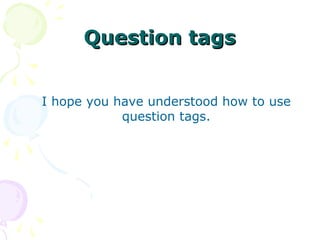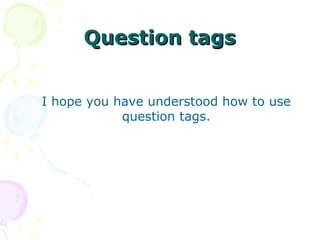Question tags
- 2. USEUSE A question tag is a short question at the end of a statement: He won the prize, didnât he? question tag We use question tags when we want to check if information is correct.
- 3. FORMFORM 1. Use question tags at the end of a sentence: He won the prize, didnât he? question tag
- 4. FORMFORM 2.a. NEGATIVE QUESTION TAG: If the sentence is positive, the question tag is negative: You have seen that film, havenât you? + - 2.b. POSITIVE QUESTION TAG: If the sentence is negative, the question tag is positive: You havenât seen that film, have you? - + If the sentence contains a negative word (never, hardlyâĶ) the question tag is positive: Ann never goes anywhere, does she? - +
- 5. FORMFORM 3. Questions tags consist of âĶ AUXILIARY VERB + PRONOUN: I shouldnât laugh, shouldshould II? Sarah was winning, wasnâtwasnât sheshe? We use the auxiliary verb that is used in the previous sentence. If there is no auxiliary verb, se use âdo/doesâ (present tense) and âdidâ (past tense): You live near here, donâtdonât you? You turned left, didnâtdidnât you? The pronoun refers to the subject of the previous sentence.
- 6. FORMFORM 4. Some verbs form question tags differently: I am ï arenât I? Iâm helpful, arenât I? There is ï isnât there? There is a chemistâs near here, isnât there? There are ï arenât there? There are many shops in the area, arenât there? This is / That is ï isnât it? Thatâs your wife over there, isnât it?
- 7. FORMFORM 5. When we answer question tags, we often use short answers: A: You are French, arenât you? B: Yes, I amYes, I am. / No, Iâm notNo, Iâm not. ï SHORT ANSWERS A: Sheâs got a dog, hasnât she? B: Yes, she hasYes, she has. / No, she hasnâtNo, she hasnât. ï SHORT ANSWERS A: You smoke, donât you? B: Yes, I doYes, I do. / No, I donâtNo, I donât. ï SHORT ANSWERS
- 8. FORMFORM 6. Intonation: When we are sure of the answer, the voice goes down in the question tag: John doesnât like gold, does he? ï The speaker knows John doesnât like gold. When we are not sure of the answer, the voice goes up: They left for Milan, didnât they? ï The speaker doesnât know if they left for Milan or not.
- 9. Question tagsQuestion tags I hope you have understood how to use question tags.
- 10. Question tagsQuestion tags I hope you have understood how to use question tags.

